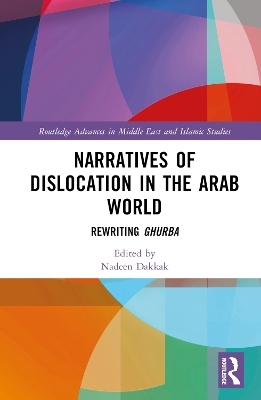
Narratives of Dislocation in the Arab World
Routledge (Verlag)
978-1-032-29478-0 (ISBN)
Distancing itself from the centrality of the “West” in postcolonial and Arabic literary studies, the book explores experiences of migration, displacement and cosmopolitanism that do not directly ensue from the encounter with Europe or the European other. Covering texts from the Levant, Egypt, the Arabian Peninsula and beyond from the 19th, 20th and 21st centuries, the book grounds narratives of dislocation in the political, social and cultural structures that affect the everyday lived experiences of individuals and communities.
An analysis of Arabic, Turkish and English texts – encompassing fiction, memoirs and translations – highlights less visible narratives of ghurba, specifically amongst ethnic minorities and religious communities. Ultimately, the chapters contribute to a picture of the Arab world as a place of ghurba where mobile and immobile subjects, foreigners and local inhabitants alike, encounter alienation.
Bringing together a diverse range of academic perspectives, the book will be of interest to students and scholars in postcolonial and comparative literary studies, history, and Arabic and Middle East studies.
Nadeen Dakkak is Lecturer in World and Postcolonial Literatures at the University of Exeter. She was IASH- Alwaleed Postdoctoral Fellow at the University of Edinburgh in 2021– 2022 and completed her PhD in English and Comparative Literary Studies at the University of Warwick. Her research examines literary and cultural productions on migration in the Gulf.
Introduction Part I: Ghurba in Narratives of Slavery and Racism 1. Dissolving into the Nile: Ottoman Reformism and Maternal Slavery in Sergüzeşt 2. Re-writing the Other: Uncovering the Legacies of Slavery in Suad Amiry’s My Damascus Part II: Ghurba in Narratives of Displacement 3. The Woman from Tantoura: Structural Marginalisation and the Re-Making of Home among Palestinian Refugees in Lebanon 4. Memory and Resistance in Susan Abulhawa’s Against the Loveless World 5. The Refugee as a "Russian Doll": Haitham Hussein’s Readings of Ghurba and Exile at the Time of the Global "Migration Crisis" Part III: Religious Spaces of Ghurba and Belonging 6. Ghurba and the Emergence of a Gendered Pious Consciousness in Popular Religious Novels by Arab Women 7. Can the Qazani Speak? Nineteenth Century Naqshbandi Migrants and Translators in Mecca During the Age of Print Part IV: Negotiating National Imaginaries of Belonging and Exclusion 8. Spectral Migrant Workers and the Paradox of Modern Nation-Building in Deepak Unnikrishnan’s Temporary People 9. The Arab-African Cultural Identity in Idris Ali’s Dongola
| Erscheinungsdatum | 17.02.2023 |
|---|---|
| Reihe/Serie | Routledge Advances in Middle East and Islamic Studies |
| Verlagsort | London |
| Sprache | englisch |
| Maße | 156 x 234 mm |
| Gewicht | 520 g |
| Themenwelt | Geisteswissenschaften ► Sprach- / Literaturwissenschaft ► Anglistik / Amerikanistik |
| Geisteswissenschaften ► Sprach- / Literaturwissenschaft ► Literaturwissenschaft | |
| Sozialwissenschaften ► Ethnologie | |
| Sozialwissenschaften ► Soziologie ► Spezielle Soziologien | |
| ISBN-10 | 1-032-29478-7 / 1032294787 |
| ISBN-13 | 978-1-032-29478-0 / 9781032294780 |
| Zustand | Neuware |
| Haben Sie eine Frage zum Produkt? |
aus dem Bereich


